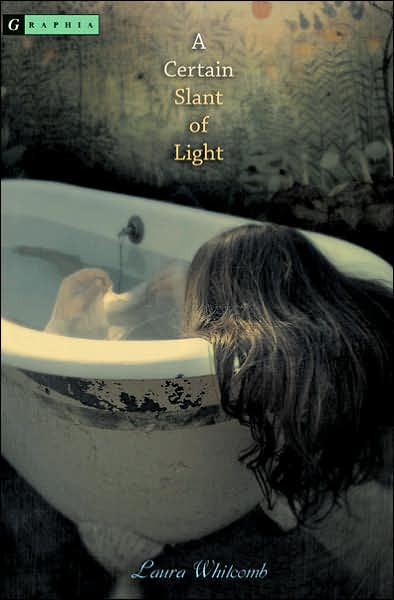 (2005)
(2005) Genre: Young Adult/Supernatural
Synopsis: 'After benignly haunting a series of people for over a century, Helen meets a teenage boy who can see her and together they unlock the mysteries of their paths.'
***
Review: From the very first paragraph this book was more promising than any I have read in quite a while. So much so that what started as a glance at the first couple of pages turned into a careful reading of the first thirty pages. I’m going to address writing style first – normally I do this to get small criticisms out of the way but I can’t fault a single word placement in this book. Only one word can describe it: poetic. It is told in first person perspective, the narrator being a female ghost of over 100 years and it’s safe to say she speaks with more than a hint of the old articulation found only in 19th and 20th century literature, which is what makes it poetic. The author, Laura Whitcomb seems to be an overt fan of classic literature and poetry, referencing Bronte, Austen and Shakespeare more than once – though I suspect its Dickinson she is partial to as her book title comes from a Dickinson poem by the same name. The style of writing is not only artistic but it plays the functional role of creating surrealism, which clashes with the harrowing contemporary situations the characters find themselves in. It is the decorum through which a desperate, raw stream of mental and physical emotions bleed.
“The library smells like old books—a thousand leather doorways into other worlds. I hear silence, like the mind of God. I feel a presence in the empty chair beside me. The librarian watches me suspiciously. But the library is a sacred place, and I sit with the patron saint of readers." – James, one of the old ghosts, writing a ‘descriptive passage’ for English class. If only we had more artistic minds like this in the world of books.
In the book we meet two characters who lead very different lives in contemporary American society – a girl from a rigid Christian household which is clearly fraying at the moral edges, and a recovering drug addict boy from an already very broken home. These two contemporary families are portrayed with all the etiquette of an old English novel. I’ll let your imagination do the work here – or better yet go read the book. And that’s not even the best bit, all of the above is only the paper canvas upon which Whitcomb paints us a poem of spiritual and supernatural exploration. Don't let the fact that its a Young Adult book deter you; its not childish, just a universally understandable exploration of, among other metaphysical concepts, spirituality and love. The surreal execution of the novel will keep you thinking throughout but leave you feeling wholly content and maybe just a little bit hopeful.
The characters are few, but they are all necessary. They are each abstract in a way, not complete people but they play the specific part any one element of a sculpture plays in creating a whole. The entire book lingers around the metaphysical. The most endearing character in my opinion is actually Mr. Brown, our ghostly narrator’s host at the beginning of the book. He remains throughout the novel and is drawn into the destruction caused by the crossover between the spiritual and physical world – as unaware as any other mere mortal of what is going on. Perhaps the biggest flaw with the book is the lack of focus on Brown towards the end – he is easily the most likeable character, so why does he lack attention at the end? Still, this is a very minor thing and the implication made about the fate of Helen’s hosts is a relatively satisfactory ending to that element.
The book switches tone a couple of times but successfully brings the reader with it each time. As it builds up towards the end where every interaction clashes in climax, one can’t help but feel like they are reading some kind of Donnie Darko adaptation. If you don’t like Donnie Darko (you’re crazy, but -) don’t let that put you off, its not dark or difficult to follow. What I mean is, the book just provides a sense of intricate metaphysical relations between all that we see and don’t see - a sense of synchronicity, if not fate. We watch the whole world come apart before it comes full circle – and everybody is a little better for it. It is an immensely cinematic and satisfying ending with the most exquisite visions of existence in the final pages – imperfect, but real.
I’ll leave you with one more quote:
“Sitting on the sloped roof of Mr. Brown's small house while he and his wife slept and dreamed below, I studied a crescent moon hung crooked in a plum purple sky and thought about what it would be like to truly be seen.”
Rating: 5/5